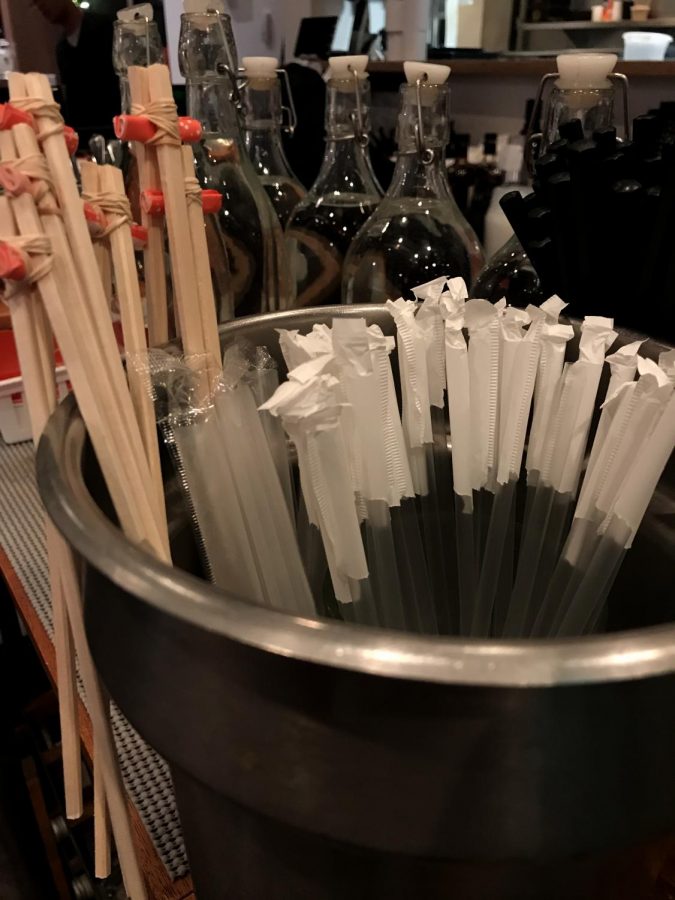Plastic Straw Use Likely Nearing Its End?
GOODBYE PLASTIC STRAWS! Millions of straws are used a day in the U.S. and people are beginning to realize their plastic footprint and the effects of pollution on the environment. As more people are looking to decrease their use of plastic, plastic straws bans are forming in cities and companies, further deteriorating the use of them and leading to their end.
September 27, 2019
The future of planet Earth is in peril and its people are striving to make a change. One recent global movement has been reducing the use of plastic straws. With over 500 million straws used a day in the U.S. alone and the increasing plastic pollution in the Earth’s oceans, people have begun to wake up to the rising problem and its consequences. But why is all the commotion surrounding pollution focused on plastic straws? Because of plastic straws’ small size and lightweight material, it makes it easy for them to slip through the cracks of dumpsters, garbage trucks, and end up on the streets and in sewers. According to Strawless Ocean, “When plastic does make it into the ocean, it breaks down into smaller and smaller pieces known as ‘microplastics’ rather than biodegrading or dissolving, which poses great threats to marine life, including fish.” Plastic has no place being in the ocean and is seen as food by many of the marine life, putting them in danger when they ingest it. For example, UGA New Materials Institute “conducted a new study which discovered microplastics particles smaller than dust or powdered sugar inside baby sea turtles. Of the turtles studied in this research, 100% were found to have eaten plastic. These baby sea turtles were likely dying due to ingested plastic pollution.”
The United States alone has a staggering amount of 500 million straws used a day and according to trvst, “There are around 7.5 million straws on America’s coastlines.” Although this number initially seems astonishing, it actually makes sense. Senior Kimberly Velez-Vega says, “I use a plastic straw two or three times a day. I don’t really think about it that much.” Due to the enormous number of plastic straws being used and discarded immediately after one use, metal straws have become popular among the current generation. When asked if she supported the movement for metal straws, junior Ashley Hickey said, “I do. I even have my own metal straw at home that I use whenever I can. I usually say no to a plastic one when I go to places like Starbucks and stuff and that makes me feel a little better about all the plastic I’m using.” With the motion to help reduce plastic pollution, many cities have already stopped using the small one-use straws. According to the AZA, “Plastic straws have been banned in several cities and countries around the globe, including New York City, Seattle, Miami Beach, Vancouver, Hawaii, California, Great Britain, Scotland, and Taiwan.” With bans like these there is no telling how many cities or countries will be inspired to do the same.
However, there are those who believe that the world’s concern regarding climate change should not be focused on getting rid of plastic straws. According to the Washington Post, in an interview with President Donald Trump, he states, “I do think we have bigger problems than plastic straws… You have a little straw, but what about the plates, the wrappers and everything else that are much bigger and they’re made of the same material?” Sophomore Maria Bolgar partially agrees with Trump saying, “Plastic straws only make up a small portion of plastic in the ocean and there are bigger things we could be focusing on reducing.” However, she disagrees saying, “But plastic straws are smaller and are more easily mistaken for food than plates or larger items.” Regardless of the opinions about plastic straws being the main focus for climate change, they are still being banned worldwide. According to ABC News, “Starbucks’ announcement that it will be going strawless soon to help the environment is part of a broader effort from private companies like McDonald’s and Marriott and cities like New York and Seattle to curb the use of plastic straws.” Considering the millions of people that attend these places daily, these companies believe their environmental-friendly switch will truly make a difference or at least spark a change in other companies. Nonetheless, there are people who think that banning plastic straws will do more harm than good. Freshman Rayesa Chouhan says, “Personally, I think the bans are just putting businesses at more risk because plastic straws are known to be cheap and effective and it has been that way for decades. But with the bans they are gonna have to start paying more money for different straws and customers may not support the switch.”
Another issue has also come up with the motion to ban plastic straws. People with disabilities have brought up their concern that plastic straw alternatives are not only inconvenient to them, but in some cases unusable. Daniel Gilbert, a disability advocate, says in an interview with ABC news, “They are the easiest for me to use and they provide the most independence for me. They’re easier to position. A lot of other straws aren’t flexible and can’t bend.”
Whatever the solution may be, it is starting with the end to plastic straws.




